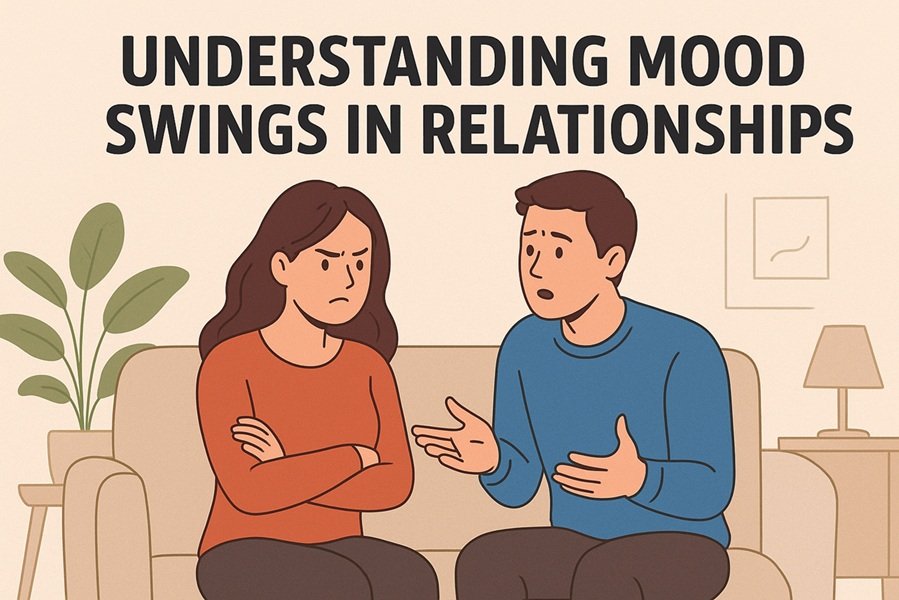Understanding Mood Swings in Relationships: How to Handle Your Partner’s Emotional Ups & Downs
Every relationship has its good days and difficult days, but when your partner’s mood shifts suddenly — from calm to irritated, from affectionate to distant, or from cheerful to withdrawn — it can leave you confused and unsure how to respond. Mood swings are not always intentional, but they do impact the emotional rhythm between two people.
The good news is that with the right understanding and communication, many couples learn how to handle these fluctuations in a healthy way.
What Are Mood Swings in a Relationship?
Mood swings are quick and noticeable changes in emotional state.
For example:
- Your partner is laughing during a call, but 30 minutes later they barely respond.
- They are excited to meet you today, but tomorrow they appear cold and distant.
- Small issues suddenly feel big to them.
This does not automatically mean the person is “wrong” or “dramatic.” Emotional waves can be caused by stress, hormones, pressure, insecurity, overthinking, or simply fatigue.
The key is understanding that the emotion may be temporary — but your reaction can make it better or worse.
Common Reasons a Partner May Experience Mood Swings
Not every mood swing has a clear reason, but some common causes include:
- Stress or Work Pressure
When someone is mentally overwhelmed, emotional reactions become more intense. - Hormonal & Biological Fluctuations
Happens to both men and women, especially during emotional or physically demanding phases. - Unprocessed Feelings or Past Experiences
Old memories or insecurities can resurface unexpectedly. - Sleep, Diet, and Lifestyle Factors
Lack of sleep, missing meals, or burnout can affect someone’s ability to stay emotionally steady. - Relationship Emotions Themselves
Love, attachment, jealousy, expectations — all can trigger emotional fluctuations.
How Mood Swings Affect the Relationship
Mood swings can impact both partners:
- One partner may feel like they must constantly adjust themselves.
- Miscommunication can grow — especially if silence replaces conversation.
- You might feel unsure whether to talk, comfort, or stay quiet.
- Over time, unaddressed mood swings can create emotional distance.
But they do not have to.
With the right approach, mood swings can become a moment of understanding, not conflict.
How to Handle Mood Swings in a Healthy Way
1. Stay Calm Instead of Reacting
If you react with irritation or defensiveness, the situation usually escalates.
Try to pause and understand whether the mood change is about you or something else.
2. Give Space When Needed
Not everyone can explain what they feel immediately.
Sometimes a 10–30 minute silent break can prevent unnecessary arguments.
3. Check In Gently
Instead of asking “Why are you behaving like this?”, try:
“You seem overwhelmed. Do you want to talk, or should I sit with you quietly?”
This shows care — not pressure.
4. Discuss Triggers When Both Are Calm
Not during the mood swing — but later, when things are normal.
Ask:
“What usually makes you feel this way? How can I support better?”
This builds emotional teamwork.
5. Protect Your Own Emotional Balance
Caring for your partner does not mean neglecting yourself.
If their mood affects your peace, take a breather — step outside, listen to music, text a friend.
Your feelings matter too.
If This Relates to Your Relationship (Personalized Insight)
You mentioned earlier that your partner enjoys intense intimacy, and you sometimes feel fear or emotional pressure.
Mood swings in such situations can create:
- Emotional confusion during intimacy
- Difficulty expressing your comfort levels
- Fear of “what mood will they be in today?”
In such cases, gentle but clear communication helps:
“I enjoy being close to you, but I need us to be emotionally in the same space. If either of us is upset, let’s slow down instead of pushing through.”
This creates safety + respect + understanding.
When to Consider Professional Support
Seek outside help if:
- Mood swings become very frequent
- Conversations always turn into arguments
- You start feeling emotionally drained or anxious
Reaching out for guidance is not a failure — it’s a step toward healthier love.
Final Thoughts
Relationships are not about being perfect.
They’re about learning to understand each other’s emotional language.
Mood swings do not mean your partner is difficult — they mean they are human.
And when both partners learn to:
- Express feelings openly
- Give space when needed
- Support without losing themselves
The relationship becomes stronger, safer, and more emotionally intimate.

